4 Types of Mosquitoes in New Jersey (With Pictures)
-
Pete Ortiz
- Last updated:
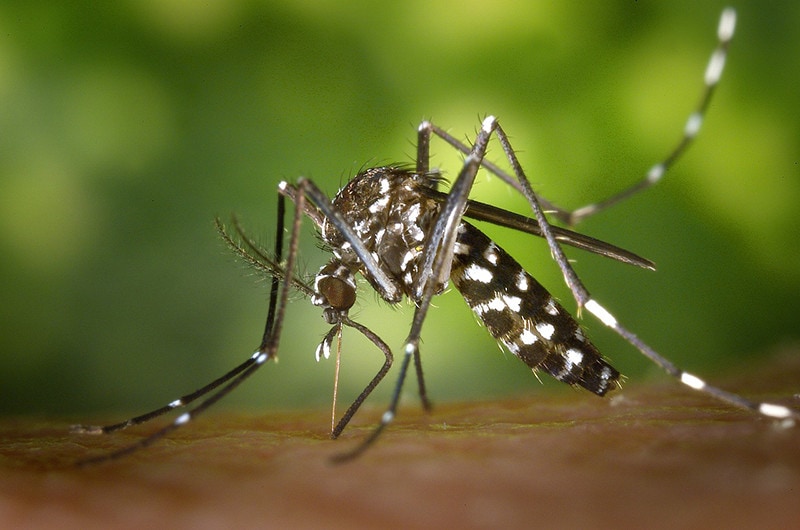
Who wouldn’t like a great weekend outdoor activity with family? The gathering could go great until you realize your outdoor space hosts mosquitoes. The little flying pests’ annoying buzzing sounds and painful bites could turn your event into a nightmare. Furthermore, mosquitoes carry several microbes, such as Leishmania, West Nile virus, and others, which could cause serious health issues for humans and animals.
Depending on the temperatures in New Jersey, mosquitoes may begin causing a nuisance from as early as March to November. It has also been proven that the number of mosquito species has increased, leading to an increase in mosquito-spread diseases.
Listed below are common types of mosquitoes in New Jersey. Some species are harmless and can easily be eliminated, while others require your full cooperation to protect yourself from the kind of disease the pests carry around. Continue reading for insight into the four types of mosquitoes in New Jersey, what to expect, and how to protect yourself.
 The 4 Common Mosquitoes in New Jersey
The 4 Common Mosquitoes in New Jersey
1. Asian Tiger Mosquito
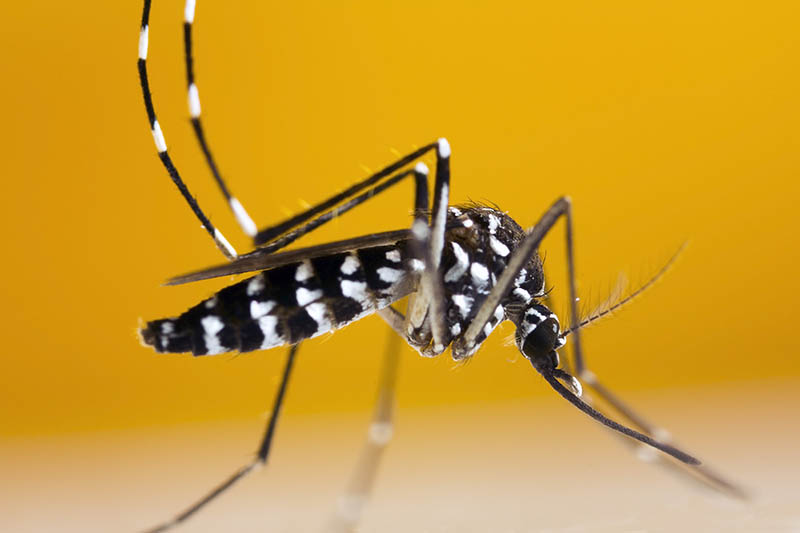
Asian tiger mosquitos, also known as Aedes albopictus, often survive in wet and warm areas. They bite aggressively mainly during the day, with their target hosts mainly including human beings, cattle, wild animals, and birds.
Health Risks Related to Asian Tiger Mosquitos
The Asian tiger mosquito is highly suspected to be responsible for the four serotypes of dengue, encephalitis, yellow fever, West Nile virus, and dog heartworm. The mosquito is also capable of carrying around the LaCrosse encephalitis and the eastern equine encephalitis viruses.
According to clinical research, the Asian tiger mosquitos may also be linked to a congenital disability illness, the Zika virus, whose antidote and a vaccine are yet to be identified.
Since the Asian tiger mosquitoes find warm wet environments a comfortable breeding place, consider getting rid of flowerpots, stagnant water, or bird baths that are too close to your house or outdoor space.
2. Cattail Mosquitoes
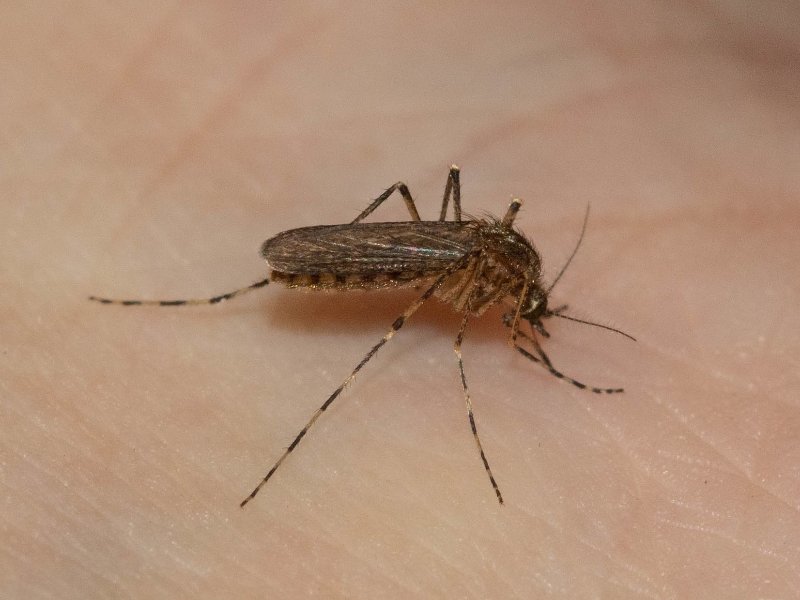
Cattail mosquitoes are also known as Coquillettidia perturbans. The larvae and pupae of the cattail mosquitoes find a comfortable host in aquatic plants whose roots are deeply rooted in thick humus-rich hydric soils. Such plants include arrowhead, pickerelweed, water lily, reeds, sedges, and water arum.
Both male and female cattail mosquitoes feed on flower nectars and other plant juices. However, the female must feed on blood to produce eggs. The females are also believed to be strong fliers as they can fly up to five miles.
Health Risks Related to Cattail Mosquitoes
Their bites are so vicious they could penetrate your clothes. As they bite, they are known to transmit the West Nile virus and eastern equine encephalomyelitis virus. As we speak, there are no human vaccines available for these viruses.
3. White-Footed Woods Mosquitoes
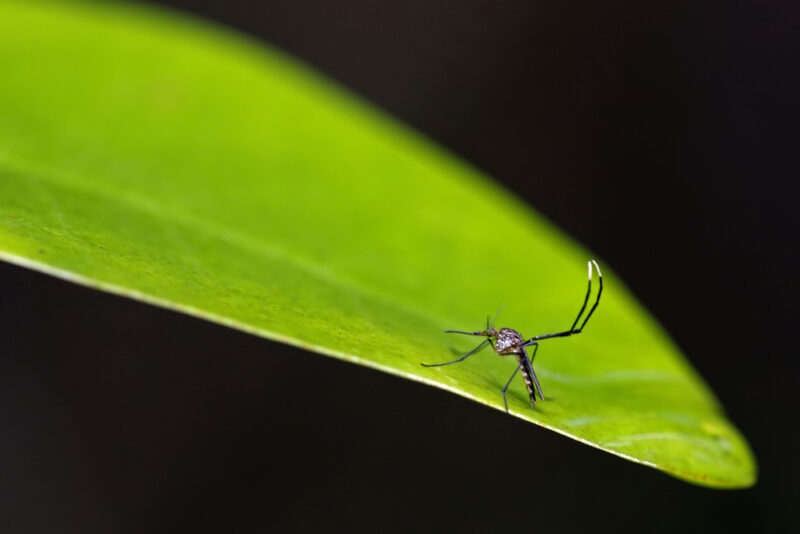
White-footed wood mosquitoes, also known as Psorophora ferox, are believed to be a bit friendly compared to other mosquito species. They are not just found in New Jersey but also in North and South America.
Adult white-footed wood mosquitoes find comfort in a woody or forest environment. To produce eggs, the female mosquitos must feed on the blood of mammals or birds. The feeding often occurs during sunrise and sunset, in the middle of the day, and sometimes even at night.
Health Risks Related to White-Footed Wood Mosquitoes
White-footed wood mosquitoes pose a great deal of health risks to human beings and domestic and wild animals. The females are believed to be highly aggressive with the bites, especially when looking for a host. They are suspected of carrying diseases like Venezuelan equine encephalomyelitis virus, Rocio virus, West Nile virus, ileus virus, una virus, and a type of bunyamwera virus.
The best way to avoid bites from white-footed wood mosquitoes is to avoid outdoor activities, especially during sunrise and sunset hours.
4. Culex Pipiens
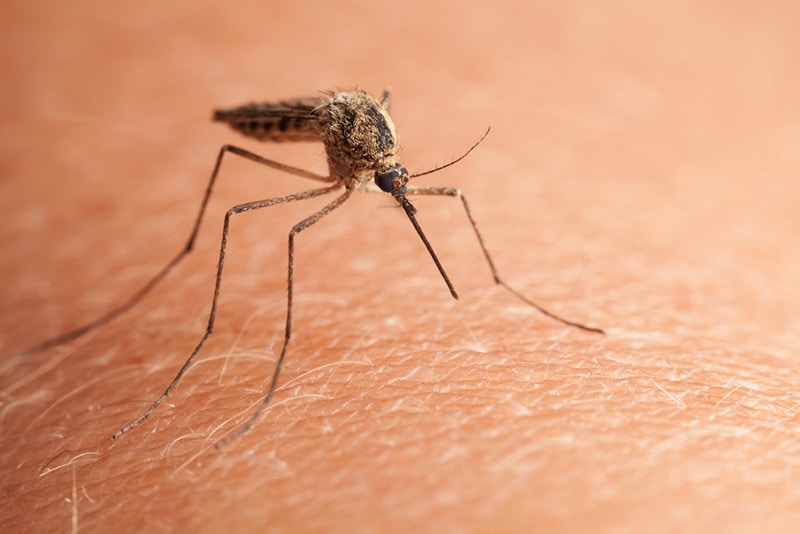
Culex Pipiens’ other common name is the common house mosquito. They often feed on vertebrates and human blood. They also enjoy doves’ and pigeons’ blood since their blood is almost similar to human beings.
Health Risks Related to the Culex Pipiens
These mosquitoes are believed to carry and spread diseases like West Nile virus, Saint Louis encephalitis viruses, avian malaria, and filarial worms. According to the World Health Organization, almost 350 million people yearly are affected by mosquito-related issues.
How Mosquitoes Find You
All species of mosquitoes do not have eyesight; the strong wind is a stumbling block to their stable flying, and they rarely fly too far. How then is it possible that they can easily find you?
- Mosquitoes Smell Your Breath: Mosquitoes, especially females that need blood to lay eggs, can trail your breath. The carbon dioxide we exhale is the easiest gas to detect and follow from 75 feet away until they get to you, even without seeing where you are located.
- Chemical Scents: Mosquitoes are attracted to chemical scents like lotions, perfumes, hair products, soap, or sweat. Just like your breath, they can detect such odors from 75 feet away and trail it to where you are.
- They Have Heat Sensors: The heat sensors of a mosquito are located around its mouth. They use these heat sensors to find the perfect spot to draw blood from your body. They can easily identify the veins in your body faster than most medical practitioners.
Furthermore, before a mosquito is found in your yard or house, there must be something that must have attracted it. The environment must be ideal for it to survive and eventually find you. It could be the wet vegetation, moisture, or even stagnant water. In such an environment, mosquitos will permanently hide and breed in your landscape, waiting for the appropriate time to feed on your blood.
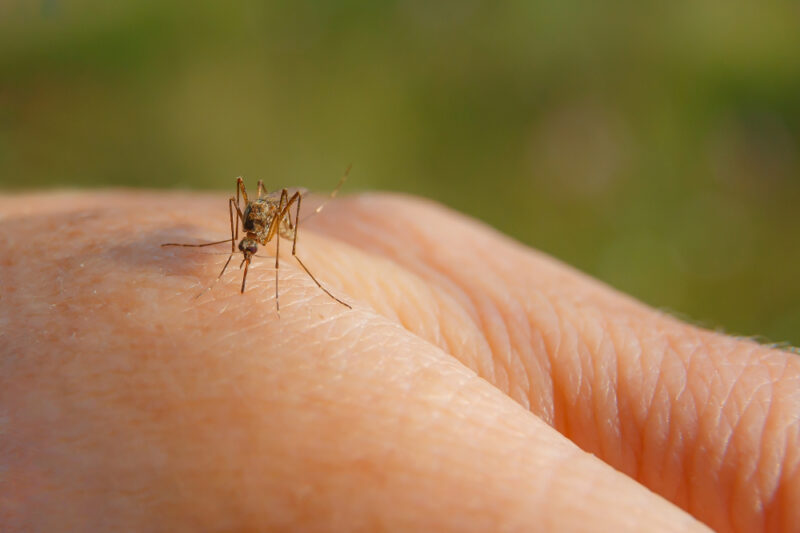
How to Avoid Mosquito Bites
Mosquitoes travel for an average of 1–1.5 miles per hour and often do not live for long. However, for the time they exist, they can cause severe health problems and maddening nuisance. If you notice the presence of mosquitos in your yard or home, consider the techniques below to prevent suffering from their painful bites.
Make Use of Mosquito Sprays
Identify an efficient mosquito spray that is safe for your children and pets. The spray should be free of synthetic toxic chemicals that could harm your health and damage the vegetation in your compound. An efficient mosquito spray will significantly reduce or completely eliminate mosquitoes in your yard, including the mosquito eggs that might hatch again into a new nuisance.
Read and understand the mosquito spray instructions before spraying it around your yard or house. Ensure you prevent your skin from getting in contact with the spray and protect yourself from inhaling the chemicals as you spray.
Get Rid of Stagnant Water
Stagnant water is a perfect breeding place for mosquitoes. Such areas include a children’s swimming pool, wading pools, clogged drain gutters, a pet bowl, garbage cans, a bird birth, or anything that can hold water or rain drops. Mosquitoes use such an environment to lay up to 300 eggs at a time.
Therefore, the best solution to these kinds of issues is to ensure they get cleaned at least twice per year, the wading pool is turned over after use, and that no container holding water remains standing up in your compound.
Eliminating stagnant water will ensure no breeding environment for mosquitoes, forcing them to move and look for another comfortable environment.
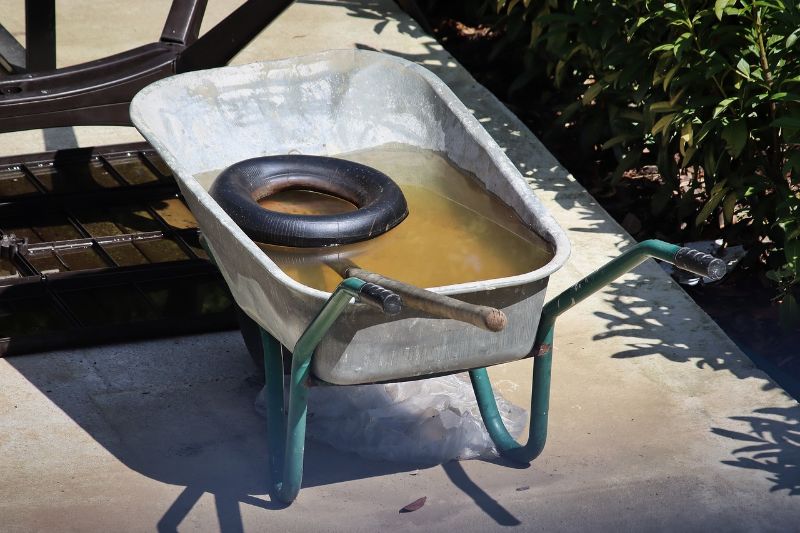
Block Off Mosquitoes
To block mosquitoes from your house, ensure there are no tears or openings in the windows or doors. Such openings will allow the mosquitoes to enter your house from the outside.
Secondly, avoid wearing sleeveless clothes while outside or in the yard. Your outdoor clothing should not be too thin since the mosquitoes can still penetrate and suck your blood through them. Also, avoid wearing short pants that won’t cover most of the skin on your legs to prevent mosquito bites.
Use Mosquito Repellants
Mosquito repellents are pretty helpful when it comes to protecting your skin from mosquitoes. However, you will want to take caution when using certain repellants. For instance, mosquito repellents containing eucalyptus oil may not be ideal if you have children below 3 years of age.
Also, do not assume that the more you use mosquito repellant on your skin, the more effective they become. Instead, use them according to the instructions provided on the bottle.
In Conclusion
As much as mosquitoes are being termed a nuisance, they are an essential part of a healthy ecosystem. For they are great food for fish and dragons and excellent pollinators. Also, out of all types of mosquitoes, only a few species are believed to be harmful to humans.
There are dozens of mosquitoes in New Jersey. However, the ones mentioned above are just the common ones that are easily accessible. As already stated, mosquitoes are attracted by wet and warm environments. Therefore, the first step to ensuring that you eliminate mosquitoes from your yard is getting rid of stagnant water, followed by other means like using mosquito sprays and repellents and then wearing mosquito-protective clothes.
- https://4njpest.com/pests/mosquitos/
- https://en.wikipedia.org/wiki/Aedes_albopictus
- https://www.cdc.gov/westnile/index.html
- https://www.ncbi.nlm.nih.gov/pmc/articles/PMC3916288/
- http://entnemdept.ufl.edu/creatures/aquatic/Coquillettidia_perturbans.htm
- https://www.ecdc.europa.eu/en/all-topics-z/disease-vectors/facts/mosquito-factsheets/culex-pipiens-factsheet-experts
Featured Image Credit: WikiImages, Pixabay
Contents

 The 4 Common Mosquitoes in New Jersey
The 4 Common Mosquitoes in New Jersey
